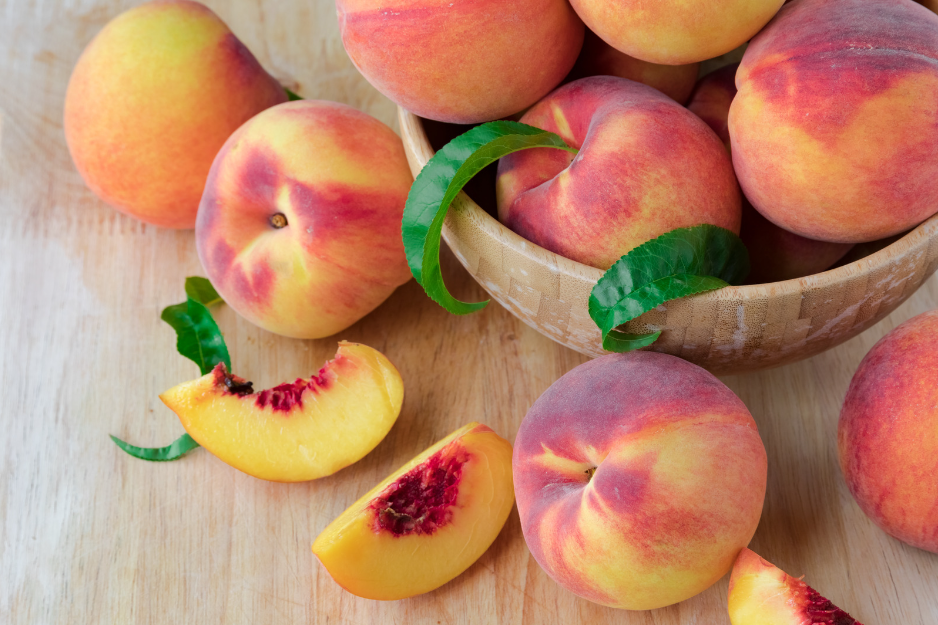Many humans enjoy peaches, delicious and nutritious fruit, especially during summer. Some dog owners may quickly share their fruit snacks with their furry friends without thinking twice. However, as with other human foods, it’s essential to exercise caution when feeding peaches to dogs. The first thing you need to know is: can dogs have peaches? We’ll answer that here along with other pointers every dog owner should know before sharing new food with their pets.
Can dogs have peaches?
Yes, dogs can have peaches. Generally, they’re safe for dogs to eat. They can also be beneficial, especially when in moderate amounts. However, there are still some things to remember when feeding peaches to dogs.
Peaches and Their Benefits to Dogs
The peach fruit is categorized as a stone fruit similar to cherries, plums, and apricots. Peaches have a stone-like central pit and come in white and yellow varieties. They are rich in nutrients and have many health benefits for humans, including improving digestion, reducing inflammation, and boosting the immune system. Fortunately, dogs can also enjoy these benefits when fed in moderation.
Peaches contain various nutrients that are beneficial to dogs. Peaches are high in vitamins A and C, fiber, potassium, and antioxidants. They also have other vitamins and minerals, such as:
- Vitamin E
- Vitamin K
- Vitamin B3 (Niacin)
- Copper
- Manganese
- Magnesium
- Phosphorus
- Zinc
- Folate
- Lutein
- Zeaxanthin
- Choline
With these nutrients, peaches can help boost your dog’s immune system. They can help maintain healthy skin, aid digestion, and prevent inflammation. It is important to note that while peaches are healthy and beneficial to dogs, they should never be a replacement for a dog’s regular diet.
The Risks of Feeding Peaches to Dogs
As with any human food, there are some risks associated with feeding peaches to dogs.
High Sugar Content
Peaches contain sugar and carbohydrates, which can lead to weight gain in dogs. Worse, their high sugar content may also lead to health problems like obesity and diabetes.
Gastrointestinal Upset
Because of its fiber content, too many peaches can cause gastrointestinal upset in dogs leading to symptoms such as diarrhea and vomiting. It’s essential to start with small amounts when introducing peaches to your dog’s diet.
Allergy
Although relatively rare, some dogs may have an allergic reaction to peaches. Symptoms of an allergic reaction may include itching, swelling, and difficulty breathing. In severe cases, it may lead to anaphylaxis, a life-threatening condition that requires immediate veterinary attention.
Peach Pit and Cyanide Toxicity
Moreover, the pit or seed of the peach can pose a significant risk to dogs. Peach pits contain cyanide, which can be toxic to dogs if ingested. Dogs should never be given peach pits, which may cause serious health complications. Symptoms of cyanide toxicity include vomiting, diarrhea, abdominal pain, drooling, lethargy, and difficulty breathing. Also, peach pits are a choking hazard and can cause intestinal obstruction or digestive tract damage.
Canned and Preserved Peaches
Canned and preserved peaches should be avoided as they often contain high amounts of sugar, preservatives, and additives that are unhealthy for dogs and may cause gastrointestinal problems.
How to Safely Give Peaches to Dogs

If you want to give peaches to your dog, opt for fresh fruit instead of canned ones. Remove the pit, cut it into small pieces, and feed it as a snack. Peaches should only be given moderately and as an occasional treat. It’s also essential to introduce peaches gradually into your dog’s diet and watch for any signs of allergic reaction or gastrointestinal upset. If you notice any adverse reactions, stop feeding your dog peaches and seek veterinary advice if necessary.
Always consult with your veterinarian before adding new food to your dog’s diet. They can provide valuable advice and help you determine the appropriate portion size and frequency of feeding peaches to your dog, considering their age, health condition, and nutritional requirements. By following these guidelines, you can safely give peaches to your dog and provide them with a delicious and nutritious snack.
Conclusion
In summary, dogs can have peaches. Generally, peaches are safe for dogs to eat if given in moderation and prepared properly. As such, one of the essential things in preparing peaches for dogs is to remove the pit or seed to avoid choking hazards and cyanide toxicity. Additionally, it is recommended to choose fresh, organic peaches whenever possible and avoid canned or preserved peaches that can harm your dog’s health. Also, peaches should only be given occasionally as a treat and in small amounts to prevent digestive problems or allergic reactions. You should also observe your dog closely for any signs of adverse reactions and seek veterinary advice if necessary. Following these guidelines ensures that your dog can safely enjoy peaches as a healthy and delicious snack. Always prioritize your dog’s health and well-being by consulting with your veterinarian and following their advice on feeding your furry friend peaches or other human foods.











